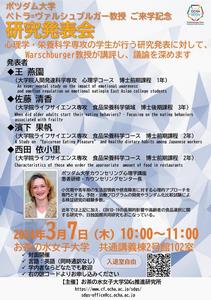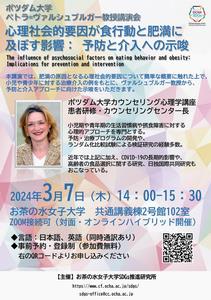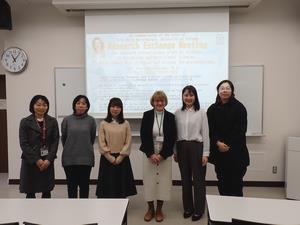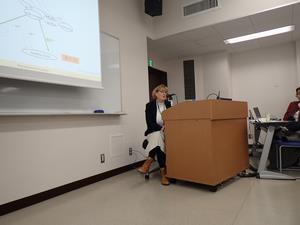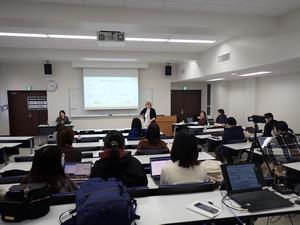- Institute for SDGs Promotion
- We held the public lecture and research exchange meeting in tribute to the visit of Prof. Dr. Petra Warschburger, University of Potsdam
ページの本文です。
We held the public lecture and research exchange meeting in tribute to the visit of Prof. Dr. Petra Warschburger, University of Potsdam
2024年3月11日更新
Report on the Public Lecture and Research Exchange Meeting
in commemoration of the visit of
Prof. Dr. Petra Warschburger, University of Potsdam
After the research exchange meeting (AM), the public lecture "Influence of Psychosocial Factors on Eating Behavior and Obesity: Implications for Prevention and Intervention" (PM) was successfully closed with 76 participants including the public. Thank you very much for your participation.
Event Outline
【Target】 Ocha-dai students, faculty and staff (REM) and the general public (only for PL)
【Venue】Room 102, Inter-Faculty Building 2 (共通講義棟2号館102室) and ZOOM (only for PL)
【Language】 English *Simultaneous interpretation was provided for the public lecture.
At the research exchange meeting, four of our graduate students presented part of their research in about 10 minutes each, and then Professor Dr. Warschburger critiqued one by one.
Ms. Yanyuan Wang, a first-year master student of Psychology course, presented 'An experimental study on the impact of emotional awareness and emotional regulation on emotional eating in East Asian college students'. She discussed whether self-control over negative emotions suppresses emotional eating through the experiment she conducted with 64 Chinese and 64 Japanese subjects.
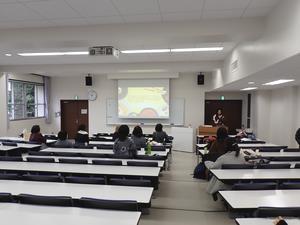 (Ms. Wang's presentation)
(Ms. Wang's presentation)
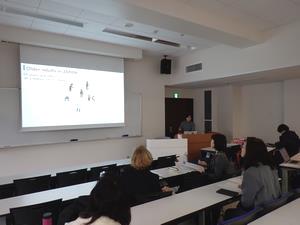 (Ms. Sato's presentation)
(Ms. Sato's presentation)
Ms. Kaho Hamashita, the second-year master student of Food and Nutritional Sciences course presented 'A Study on "Epicurean Eating Pleasure" and healthy dietary habits among Japanese workers'. She implied through the results of questionnaire survey that gastronomy provides people with ideal dietary habits in terms of adequate nutritional balance and consumption of a variety of vegetables, even if they are not conscious of their health management.
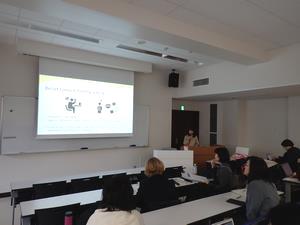 (Ms. Hamashita's presentation)
(Ms. Hamashita's presentation)
Ms. Iori Nishida, the second-year master student of Food and Nutritional Sciences course gave a presentation titled 'Characteristics of those who order the appropriate amount of food in restaurants'. She revealed through the data obtained from questionnaire surveys, although people optionally order the size of foods which they prefer at restaurants such as family restaurants, the higher the income and education of women, the stronger the tendency is.
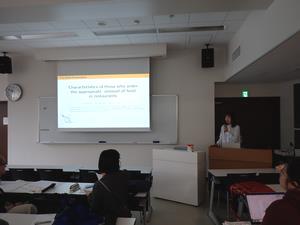 (Ms. Nishida's presentation)
(Ms. Nishida's presentation)
During each presentation, Professor Dr. Warschburger provided comments, questions, and other feedback, and the four graduate students introduced their research in one hour, allowing them to interact closely with Professor Dr. Warschburger, whose expertise truly straddles psychology and eating behavior.
Ms. Sato, Ms. Nishida, and Ms. Hamashita are seminar students of Professor Rie Akamatsu, a researcher of this institute. They wrote comments on their participation in this meeting in a relay-style blog, "Yamane's Growth Diary"(J). This is an active website that shows what is going on in the University's laboratories, and we hope you will look at it
At the public lecture ‘The influence of psychosocial factors on eating behavior and obesity: Implications for prevention and intervention’, Professor Dr. Warschburger gave a one-hour lecture on her research on psychosocial analysis of factors in eating behavior that lead to obesity, followed by 20 minutes of questions from the audience and ZOOM participants.
(1) Because Obesity is visible, it is evident for both self and others.
(2) Everyone is a party to eating (to live) and therefore cannot help but make (be made) sensible comments on weight and body shape management.
(3) People are responsible for their own weight and body shape, and obesity is considered as the result of behavioral (habitual) choices that should be easily corrected.
(4) Since appearance is a principal factor in creating an impression, overweight people are easily judged as lazy or lacking willpower.
(5) The idea that obesity is detrimental to aesthetic standards puts pressure on people to lose weight, and they cannot help but think about the risk of eating disorders.
To eliminate obesity, changing one's lifestyle is essential: however, psychosocial burdens above should be relieved while restricting diets via transiting from unhealthy foods to healthy ones, eliminating lack of exercise, and steadily changing unhealthy habits from the ones you have decided on. And she emphasized that it is crucial for parents to promote their young children and adolescents to address the above.
Obesity in youth causes negative reactions within and among individuals, leading to further obesity. Professor Dr. Warschburger has given us a realistic and practical insight into what is the psychology that causes the unbreakable negative cycle and what are the efforts needed to break it.
We would like to thank Professor Dr. Warschburger for her great presentation again through this article. Besten Dank!





